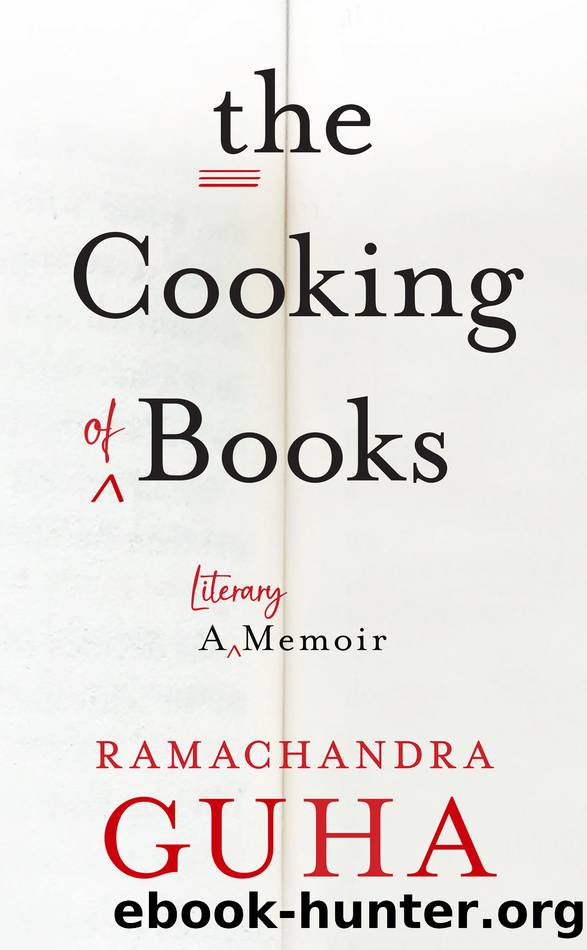The Cooking of Books by Ramachandra Guha

Author:Ramachandra Guha [Guha, Ramachandra]
Language: eng
Format: epub
Publisher: HarperCollins Publishers
Published: 2024-01-18T00:00:00+00:00
Rukunâs pamphlet satirizing late Subaltern Studies was dedicated to:
All Bengali intellectuals
and others whose dollar salaries
have risen with the help of
obscurity and jargon
Rukun was (and remains) pleased with his pamphlet, which was quite widely read when it first appeared. I cannot say I concur with the authorâs judgement. The jokes are too inward, self-indulgent, the references to body parts and potty techniques tiresomely crude. A far better takedown of academic jargon is contained in an earlier essay by Rukun, published in an edited volume whose other contributors were all teachers of English literature, as he himself had once been. While the others wrote solemnly about what it meant to teach a foreign language in India, Rukun contributed a publisherâs perspective, of what it meant to edit, print, and market books on English literature in this country.
Rukunâs essay alternates between scholarship and whimsy, between details of how publishers identify gaps in the market and how they seek to fill them, with jokey asides on the penchant for self-interrogation and self-flagellation that had overcome humanistic scholarship worldwide. This paragraph seems as funny as when I first read it, almost thirty years ago:
It is now customary, before embarking on such âprojectsâ and âinterventionsâ, to emerge from clouds of âmystificationâ by âforegroundingâ oneâs âsubject positionâ within the âdiscourseâ, or, as might be said, conversationally, introducing oneself. Born of partition refugees (father Sindhi, mother Punjabi) whose psyches were scarred enough by communalism to make them want to transcend it by making pots of secular money, this being a supposedly heritable trait, I was â to push to unnecessary limits an already long-winded Henry Jamesian sentence (he is, incidentally, a writer I loathe even more than did E.M. Forster, on whom I wrote a Ph.D. dissertation at Cambridge, a place I love and am sometimes nostalgic about to the point of soul-sickness) â educated in an Indian public school which deeply scarred my own psyche in innumerable and unmentionable ways, until I escaped â like a barbarian entering decadent Rome â into the joyous hedonism of English literature in the gardens and ivory towers of St. Stephenâs College and, subsequently, Cambridge. What followed is more mundane, though, I suppose, also more pertinent to the present essay: I joined the Indian branch of Oxford University Press in 1982 and have lived within the shadow of its hegemonic umbrella, though not in a very subject position, ever since.
Download
This site does not store any files on its server. We only index and link to content provided by other sites. Please contact the content providers to delete copyright contents if any and email us, we'll remove relevant links or contents immediately.
| Actors & Entertainers | Artists, Architects & Photographers |
| Authors | Composers & Musicians |
| Dancers | Movie Directors |
| Television Performers | Theatre |
Cecilia; Or, Memoirs of an Heiress — Volume 2 by Fanny Burney(31944)
Cecilia; Or, Memoirs of an Heiress — Volume 3 by Fanny Burney(31929)
Fanny Burney by Claire Harman(26597)
We're Going to Need More Wine by Gabrielle Union(19034)
Plagued by Fire by Paul Hendrickson(17405)
All the Missing Girls by Megan Miranda(15954)
Cat's cradle by Kurt Vonnegut(15334)
Bombshells: Glamour Girls of a Lifetime by Sullivan Steve(14057)
For the Love of Europe by Rick Steves(13907)
Leonardo da Vinci by Walter Isaacson(13316)
4 3 2 1: A Novel by Paul Auster(12375)
The remains of the day by Kazuo Ishiguro(8975)
Adultolescence by Gabbie Hanna(8922)
Note to Self by Connor Franta(7663)
Diary of a Player by Brad Paisley(7559)
Giovanni's Room by James Baldwin(7326)
What Does This Button Do? by Bruce Dickinson(6195)
Ego Is the Enemy by Ryan Holiday(5413)
Born a Crime by Trevor Noah(5375)
